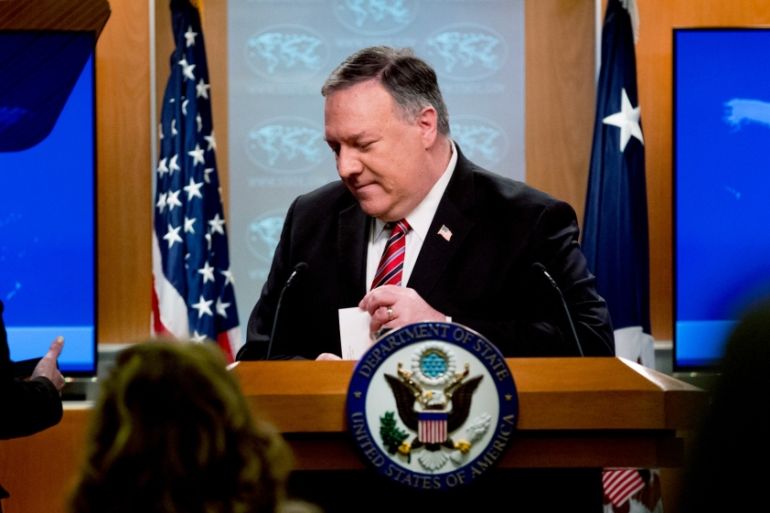US says China security law a ‘death knell’ for Hong Kong autonomy
US top diplomat Pompeo calls China’s proposed legislation ‘disastrous’, says it could affect how US treats Hong Kong.

US Secretary of State Mike Pompeo on Friday rebuked China for its proposed national security legislation on Hong Kong, calling it arbitrary and disastrous, and saying it could affect the favourable US treatment of the semi-autonomous territory.
“The United States condemns the … proposal to unilaterally and arbitrarily impose national security legislation on Hong Kong,” Pompeo said in a statement.
Keep reading
list of 3 itemsCan Chinese companies be barred from US markets?
China’s parliament: What it is likely to say about the economy
“The United States strongly urges Beijing to reconsider its disastrous proposal, abide by its international obligations, and respect Hong Kong’s high degree of autonomy, democratic institutions, and civil liberties, which are key to preserving its special status under US law,” he said. “The decision to bypass Hong Kong’s well-established legislative processes and ignore the will of the people of Hong Kong would be a death knell for the high degree of autonomy Beijing promised.”
The proposed bill, submitted on Friday’s opening day of China’s national legislative session, would forbid secessionist and subversive activity, as well as foreign interference and terrorism. It comes after months of pro-democracy demonstrations last year that at times descended into violence.
Wang Chen, vice chairman of the National People’s Congress, said the protests and violence in Hong Kong had challenged the “one country, two systems” principle and the aim of the legislation was to stop any behaviour that posed potential security threats.
Hong Kong’s legal system and enforcement must be established and improved “at the state level”, he said.
China’s foreign ministry said: “The Chinese government is determined in safeguarding national sovereignty, security and development interests, following through the policy of ‘one country, two systems,’ and opposing any external interference in Hong Kong affairs.”
Tanya Chan, a pro-democracy member of member of Hong Kong’s Legislative Council, countered that the proposal violates the Basic Law. “It is a complete dishonour of promises made under the Sino British Joint Declaration, as well as all the promises made by the Chinese government to us and the world,” she said.
‘Impact assessment of status of territory’
Friday’s statement from Pompeo, the top US diplomat, went further than the State Department’s warning to China a day earlier and showed how rapidly the world has reacted to news that Beijing is set to impose new national security legislation on Hong Kong, despite last year’s pro-democracy protests in the territory.
The “Hong Kong Human Rights and Democracy Act” approved by US President Donald Trump last year requires the State Department to certify at least annually that Hong Kong retains enough autonomy to justify favourable US trading terms that have helped it maintain its position as a world financial centre.
“Any decision impinging on Hong Kong’s autonomy and freedoms as guaranteed under the Sino British Joint Declaration and the Basic Law would inevitably impact our assessment of One Country, Two Systems and the status of the territory,” Pompeo said.
Responding to previous statements by the US, China has accused Pompeo of “blackmailing” the Hong Kong government with the Hong Kong Human Rights and Democracy Act and interferring in China’s internal affairs.
Pompeo said on Wednesday the recent treatment of pro-democracy activists in Hong Kong makes it harder to assess whether the territory remains highly autonomous from China, a requirement for special treatment the city gets under US law.
A spokesman for the Chinese foreign ministry’s office of the commissioner to Hong Kong said in a statement Pompeo’s actions cannot scare the Chinese people and that Beijing will safeguard its sovereignty, security and development interests.